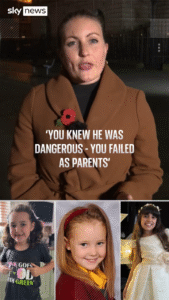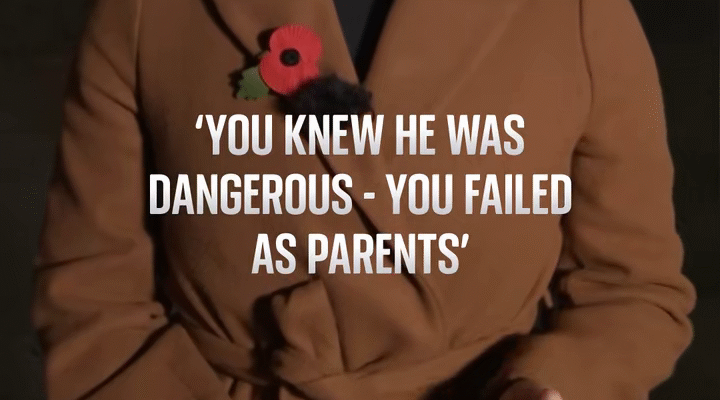The Unthinkable Tragedy and the Weight of Unanswered Questions

The Southport attack, a day of unspeakable horror that resulted in the klling of three young girls—Elsie Dot Stancombe, seven, Bebe King, six, and Alice da Silva Aguiar, nine—at a children’s holiday club, has left an indelible scar on a community and the nation. The senselessness of the crime, committed by a 17-year-old, Axel Rudakubana, has forced a full public inquiry to scrutinise the systemic and individual failures that allowed a known dnger to go unchecked.
This chapter of the inquiry, focusing on the parental context of the perpetrator, has brought to the forefront deeply disturbing evidence and has amplified the raw, agonising calls for justice and accountability from the bereaved families. The evidence given by the k**ller’s parents, Alphonse Rudakubana and Laetitia Muzayire, painted a shocking picture of a home environment where a violently unpredictable teenager was allowed to spiral, amassing an arsenal of weapons without meaningful intervention.
The Parents’ Startling Admissions
Axel Rudakubana’s parents, giving evidence to the inquiry, presented a narrative of a family that had “completely lost control” over their son. They described him as a “violent, unpredictable teenager” and, in one instance, his father, Alphonse, called him a “monster.” These were not the revelations of strangers, but the admission of those closest to him, who had witnessed his escalating d**nger for years.
The inquiry heard extraordinary details of their failure to act on clear and terrifying warning signs:
- Knowledge of Weapons: Alphonse Rudakubana admitted to knowing his son had been receiving packages containing weapons, including a machete, which he had delivered to the family home. Shockingly, he stated that if he had reported the machete to the police a year earlier, he believed the later atrocity “wouldn’t have happened.”
- A Preventable Attack: Just a week before the triple mder, Alphonse stopped his son from taking a taxi to his former school. He believed his son was planning an arson attack and was carrying a knfe. When confronted, Axel threatened his father with a kn**fe, warning, “the next time you stop me, there will be consequences.” Despite this direct, explicit threat and clear intent to harm others, Alphonse still did not call the police, fearing his son would be taken into care or arrested.
- The Final Minutes: The day of the attack, the parents and older brother found the opened packaging of the kn**fe Axel used in the attack, just minutes after he left the house—the first time he had been alone outside in over two years. His mother, Laetitia, even with this discovery and her son’s unexplained departure, reportedly went back to bed after recovering from a night shift, praying his “walk went well.” They still did not alert the authorities.
The father expressed being “desperately sorry” and said the love he had for his son had “overrode good judgment.” His mother expressed profound remorse, stating, “There are no words that can ever be enough to express our grave remorse for the children whose lives were taken or forever changed by my son’s actions.” She also revealed her own trauma concerning knves**, having experienced violence in the Rwandan genocide, but tragically, this personal history did not compel her to fully confront the d**nger in her own home.
Victims’ Families Demand Criminal Sanctions
The victims’ families, represented by their lawyer Chris Walker, have reacted to the parents’ testimony with “complete disdain” for their excuses and have made a clear and powerful demand: they would like to see Axel Rudakubana’s parents go to prson** for failing to stop him.
This demand stems from the profound belief that the tragedy was not an inevitable act of fate, but the direct result of a catastrophic, prolonged failure of parental responsibility. They argue that the parents’ choices—to stay silent, to prioritise their own concerns over the safety of the public, and to enable their son’s dngerous behaviour—directly contributed to the mrders of their innocent daughters.
The three families issued devastatingly personal and powerful statements following the parents’ evidence, each reflecting the depth of their anguish and fury:
Parents of Elsie Dot Stancombe (Jenni and David Stancombe):
Elsie’s parents condemned the parents’ actions as “a failure of parenting on a whole new level.” They argued that this was not merely a private failure but a failure “as members of our society”—a breach of the fundamental duty to ensure one’s child does not cause harm to others.
“They knew how dngerous he was, yet they stayed silent. They didn’t report their concerns, they didn’t act, and in doing so, they failed not only as parents but as members of our society. Parents should be culpable when they knowingly allow such eil to exist unchecked under their own roof… Their failure led to our daughter’s mder.”
Parents of Bebe King (Lauren and Ben King):
Bebe’s parents described the actions of Rudakubana’s parents as “deeply disturbing and shameful,” accusing them of being “absent” and “turning away from their duties.” They focused on the repeated opportunities the parents had to intervene and the continuous pattern of neglect.
“What we’re struggling to comprehend is not just their failure then, but their failure now—to acknowledge, to take responsibility, to face up to what they allowed to happen.” They asserted that if the parents had acted “with any real sense of duty, Bebe, Elsie and Alice would still be here. It is that simple.”
Parents of Alice da Silva Aguiar (Alex and Sergio Aguiar):
Alice’s parents spoke directly to the parents of the k**ller, placing the blame squarely on their inaction. They stated that the “tragedy was not inevitable” but the result of a profound dereliction of their moral and legal obligations.
“You failed Alice. And because of those failures, we have lost everything.” They insisted that as parents, they had a “fundamental and moral duty” to correct harmful behaviour and prevent harm, a duty that “was not upheld.” They asserted that the system also failed their daughter, but so too did his parents. “The system failed Alice. You failed Alice.”
The Wider Failure of a System
While the video clip and the families’ statements focus heavily on parental failure, the wider public inquiry is examining the “wholesale failure” of various agencies that had contact with Axel Rudakubana in the years leading up to the attack. Evidence has indicated a systemic breakdown in communication and a multitude of missed opportunities:
- Repeated Referrals: The teenager was referred to the government’s counter-extremism program, Prevent, on multiple occasions but was consistently discharged or deemed not to meet the threshold for intervention.
- Mental Health Concerns: The inquiry heard that there was sufficient evidence nearly a year before the attack to warrant an assessment under the Mental Health Act, which could have led to treatment, but this never occurred.
- Police Contact: Two years prior to the attack, Rudakubana was caught by police with a knfe on a bus and admitted he intended to mrder someone to delete his social media profiles. He was not arrested.
- Online Extremism: The teenager was allowed to fester in dark places online, searching for and consuming violent, atisemitic, ati-Islamic, and sxist materials, and using sites like Amazon to procure a stockpile of wapons using his father’s details. Amazon admitted to the inquiry that age verification checks were too easy to bypass.
Implications and the Call for Culpability
The current phase of the inquiry has concluded, with the Chairman, Sir Adrian Fulford, expressing hope that the process has provided the victims’ families with “some answers.” However, the raw emotion and the collective demand for criminal sanctions against the k**ller’s parents underscore a profound frustration with the concept of accountability.
The lawyer for the families, Chris Walker, confirmed the families’ clear intent to pursue “criminal sanctions,” highlighting the legal complexity but societal urgency of establishing an “element of parental responsibility” for d**ngerous failures of control.
This tragic case lays bare a critical question for society and the legal system: To what extent should parents be legally and criminally responsible when they are aware of a child’s escalating, dngerous, violent intent and possess the means to alert authorities, yet choose not to, resulting in the most devastating of consequences?
The families of Elsie, Bebe, and Alice believe the answer is clear. For them, accountability for the mrders of their little girls extends beyond the 17-year-old who wielded the knfe; it includes the adults who knowingly facilitated the environment for eil** to thrive and failed to protect the world outside their door. Their ongoing fight is not just for justice for their daughters but for a change in the law that ensures parental failures of this magnitude are never again allowed to pass without consequence.
